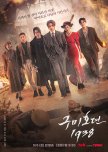
Doona: Lost Potential & Mixed Signals
"Doona!" began with a premise that promised an intriguing dynamic between its main characters - Doo Na, a former member of the girl group Dream Sweet, and Won Jun, a college student unaware of her celebrity status. Their initial misunderstandings had the potential to craft a compelling narrative about identity, fame, and genuine connections.However, as the episodes progressed, the series seemed to lose its way. The first episode depicts Lee Doo-Na (brilliantly portrayed by Bae Suzy) in a prolonged state of introspection, seemingly detached from Won Jun (played by Yang Se-Jong). This sense of detachment quickly shifts in the following episode, making Doo Na's motivations perplexing. A subtle indication of her character's emotional volatility could have been appreciated, but the stark contrast between episodes feels inconsistent.
A significant subplot that added to my confusion was Doo Na's complex relationship with an older character, her manager P. This relationship, seemingly oscillating between paternal and romantic feelings, could have been a deep dive into Doo Na's psyche. Instead, it felt like an underdeveloped plot device that only muddied the waters. The series tried to touch upon Doo Na's inner turmoil and her need for validation, but the execution often felt superficial, making her actions seem capricious rather than profound.
Throughout the nine episodes, there were moments that felt drawn out, such as prolonged smoking scenes and introspective silences. While such scenes can be artistically valuable, in "Doona!" they often felt like fillers, detracting from the overall pacing. The dialogues, though meant to be meaningful, often fell short, leaving me craving more depth and clarity.
In conclusion, while "Doona!" had the potential to be a nuanced exploration of fame, identity, and relationships, it felt disjointed and, at times, directionless. The series tried to tackle complex emotions but often skirted around them, making the narrative feel somewhat hollow. I had high hopes but was left with a sense of unfulfilled potential.
Esta resenha foi útil para você?

Esta resenha pode conter spoilers
Genius & Missteps
'A Bloody Lucky Day' initially captivated me with its promising premise and a cast brimming with potential. The portrayals by Oh Taek and Yoo Yeon Seok were particularly commendable, showcasing a range of emotions – fear, love, despair, and hope – with admirable finesse. Lee Jung Eun, embodying the anguish and vengeance-driven mother Hwang Soon Kyu, added depth to a story woven around loss and revenge.Despite the strong performances, the series, unfortunately, falls short of its potential, primarily due to a script that seems stretched beyond its natural conclusion for monetary gains. This dilution of narrative intensity becomes glaringly apparent in the conclusion of episode six, which, in my view, would have been a more fitting end to the story.
The series' pivotal moment – the confrontation between Hwang Soon Kyu and the antagonist Geum Hyuk Soo – was disappointingly executed. The build-up to this moment, laden with Soon Kyu's grief and hunger for vengeance, loses its impact in a sequence that felt more like a convenient plot device than a logical progression of the story. This anticlimactic resolution contradicts the strength and determination previously shown by Soon Kyu, reducing the character's journey to a mere footnote.
Additionally, the series introduces peripheral characters that serve little more than cannon fodder, whose sole purpose seems to be their inevitable demise at the hands of the killer. A particularly frustrating instance of this occurs during a sequence involving the taxi sending out an emergency signal. Two characters, instead of sensibly calling the police upon noticing the distress signal, choose to recklessly follow the taxi. This decision, devoid of any logical reasoning, inevitably leads to their swift and somewhat predictable deaths. Their inclusion and quick exit from the plot, while infuriating, at least doesn't prolong their senseless storyline. It was a moment where one might fleetingly think they almost deserved their fate for such blatant disregard for their own safety.
Despite these criticisms, the series does manage to redeem itself in parts, especially with the clever subplots involving the killer, which added a layer of intrigue and suspense. Yet, the final moments, involving an underdeveloped and ineffective detective character and a somewhat clichéd intervention by Taxi driver Lee Sung Min's son, were underwhelming, to say the least.
The soundtrack, another aspect where the series could have shined, was lackluster and failed to complement the tone of the series effectively.
In conclusion, 'A Bloody Lucky Day' is a series with a strong start and commendable performances that, unfortunately, gets ensnared in its own narrative complexities and commercial constraints. It's a series that could have been a masterful exploration of grief and retribution but ends up as a mere reflection of what might have been
Esta resenha foi útil para você?

Ballerina (2023): A Flawed Execution
"Ballerina" makes the unfortunate decision to forgo its roots in Korea’s unique and captivating culture, opting instead for a Westernized presentation that permeates not only its soundtrack but also its overall ambiance. From the outset, the film presents itself as nothing more than a rehash of the worn-out, classic revenge tale we've all seen too many times to count, offering a viewing experience that's at best, one-time watchable.The narrative unfolds with laughably poor acting coupled with a nonsensical revenge plan, culminating in a ridiculous "girls triumph" trope that falls flat on its face. Our protagonist, Ok-ju, initially appears as a passive character who miraculously transforms into a one-woman army capable of taking down a room filled with armed men - men who decided, quite arbitrarily, to turn their weapons against her despite their initial inaction. This far-fetched scenario screams of forced feminism and ends up feeling like a mockery rather than an empowering narrative.
The over-the-top ending does nothing to endear Ok-ju to the audience, leaving viewers with a bitter aftertaste and no connection whatsoever to the supposed hero of the story. It begs the question, why didn’t she use her firepower from the beginning? The decision to withhold until later scenes feels like a poorly conceived attempt to inject suspense, ultimately coming off as needless and contrived.
However, where "Ballerina" should shine - its action scenes - it instead fumbles terribly. The film's fight sequences are a chaotic mess, with the director opting for rapid, disorienting changes in camera angles that leave viewers struggling to follow. Far from being engaging or impressive, these scenes are a visual cacophony with no real impact. To add insult to injury, the soundtrack does little to complement these sequences, failing to enhance the viewing experience and leaving much to be desired.
In conclusion, "Ballerina" is a film you might watch once out of sheer curiosity but it is certainly not one that will leave a lasting impression or beckon for a rewatch. With its clichéd storyline, weak acting, and poorly executed action scenes, it’s a disappointing addition to the Korean film landscape. One can only hope future productions learn from these mistakes and deliver content that truly reflects and celebrates the rich tapestry of Korean culture and storytelling prowess.
Esta resenha foi útil para você?

Pasin's Saving Grace
The series started off on a high note but quickly lost its grip, leading to a storyline that felt disjointed and lacking in coherence. Despite the narrative's decline, Kim Min's portrayal of Pasin was notably engaging, his acting skills shining brightly against the backdrop of the series' shortcomings.A special thanks to Kim Min for his exceptional performance. His dedication and talent brought a unique charm to his role, making his portrayal a memorable aspect of the series. His effort was a silver lining, deserving of recognition and appreciation.
Esta resenha foi útil para você?

Eye Candy Over Substance: Why 'Tale of the Nine Tailed' Fails to Impress
As a friend who wants to guide you through the maze of television dramas, let me tell you this: "Tale of the Nine Tailed" is a profound disappointment. It's a series that seems to promise so much but delivers so little.Let's begin with the effects. In the era of sophisticated computer-generated imagery, where viewers are treated to highly realistic and immersive visual spectacles in other shows, "Tale of the Nine Tailed" falls flat on its face. The effects are so poorly executed that they rip you right out of the story. They do not blend seamlessly with the live-action sequences, and instead stick out like sore thumbs. They are far from convincing or realistic, creating a visual dissonance that disrupts the viewing experience.
Next up is the script. A compelling script is the backbone of any successful drama. It pulls the viewers in, makes them care about the characters, and keeps them at the edge of their seats. However, the script for "Tale of the Nine Tailed" failed to capture my interest. It's not that it's bad, but it just doesn't have anything unique or interesting to offer. The dialogues feel stale and the plot lacks any fresh ideas or intriguing twists. Instead of leading viewers through a maze of surprises and revelations, it feels like a lazy stroll through a park we've visited too many times before.
And the fight scenes? They are not just poorly choreographed, but downright embarrassing. In an age where we've seen the heights that television fight scenes can reach, "Tale of the Nine Tailed" seems to be stuck at the bottom. The movements of the actors seem stiff and unrealistic, the timing is off, and the whole sequence seems hastily put together without much thought or effort. It's like watching a poorly rehearsed school play, not a high-budget television drama.
One might wonder then, why is this series so popular? The answer lies not in its storyline or production quality, but in the appeal of its lead actors. Yes, the actors are good looking, and they do a commendable job with what they are given, but is that enough reason to watch a show? Shouldn't we be demanding more than just a pretty face on the screen? Shouldn't we want engaging storylines, well-executed action scenes, and convincing performances?
The popularity of "Tale of the Nine Tailed" seems to underscore a concerning trend where style is prioritized over substance. Where viewers are more attracted to the superficial aspects of a show, like the attractiveness of its leads, rather than the depth and quality of its storytelling. This is not to say that good-looking actors cannot be a part of quality shows. On the contrary, when combined with a strong script, meaningful character development, and quality production, they can enhance the viewing experience.
In conclusion, I urge you to think critically about what you choose to watch. Don't let the good looks of the actors cloud your judgment. Do yourself a favor and give another series a chance, one that prioritizes substance over style. A series that respects its viewers and does not take their time and attention for granted. After all, there's so much more to good television than just pretty faces.
Esta resenha foi útil para você?

Beauty Over Brains: A Dramatic Fiasco
Prepare for a bewildering ride with this drama, a unique spectacle that takes 'over the top' to new heights. It's not just a series; it's an expedition into the wildly absurd.The storyline embarks on a journey of irrationality that's hard to follow. Picture the most outlandish plot you can, then multiply that by ten. That's what you're getting into. Each episode seems to outdo the previous in terms of sheer irrationality, leaving you more puzzled than entertained.
The performances? Let's just say they're... memorable. The cast seems to have a singular understanding of acting: the louder, the better. It's as if the director equated yelling with deep emotional portrayal, resulting in a constant barrage of noise that's more jarring than impactful.
The portrayal of Han Mo Ne in the drama deserves a special mention for all the wrong reasons. Her character, despite having minimal screen time, is excessively dolled up with elaborate makeup, hair, and wardrobe, almost as if she's being prepared for a grand showcase. This overemphasis on her appearance feels like a shallow attempt to distract from the drama's lack of depth. It comes across as if the show is trying to compensate for its many shortcomings by turning Han Mo Ne into a mere visual spectacle, reducing her to an object of beauty rather than a meaningful character.
Every actor in this series seems to be competing for the most exaggerated performance, creating a unanimous dive into the realm of the overdramatic. It makes you wonder if there was an unspoken challenge to deliver the most over-the-top portrayal possible.
In summary, this drama serves as a prime example of a cinematic venture going wildly astray. It's a perplexing mix of poor choices, standing as a stark reminder of how not to execute a drama series. If you're curious about how a show can spiral into chaos, give it a watch. Otherwise, consider this a cautionary tale – some things are better left unwatched.
Esta resenha foi útil para você?

A Disappointing Dive from a Thrilling Start
"My Lovely Liar" initially captured my attention with its unusual and promising beginning. The first few episodes, filled with hints of suspense and action, led me to believe that I was about to embark on a captivating journey. However, my excitement was short-lived. As the series progressed, it became clear that the narrative was losing its grip. What could have been a multifaceted drama with twists and turns settled into a predictable and uninspiring romance.The depth and intricacy I had hoped for were overshadowed by clichéd romantic tropes that failed to engage or surprise. Furthermore, the character development seemed superficial, leaving me yearning for more substance. The storyline lacked the intensity and richness that the opening episodes promised, making the viewing experience somewhat unsatisfactory.
I can't help but think that the show's widespread appeal might be largely due to the charisma and appearance of the lead actors. Their performances, while commendable, were not enough to salvage the plot's shortcomings. In essence, "My Lovely Liar" felt like a missed opportunity, a series that could have delivered so much more but chose to tread the familiar and overused path of romance without much depth.
Esta resenha foi útil para você?

Annoying FL
The script is terrible, the main girl character is a total bitch. The only good thing about the series: Bad girl character and police character. The acting of the two characters is okay.The rest sucks. The person playing FL can't even make facial expressions due to plastic surgery. She can't even talk properly about her lip fillers. It doesn't even look beautiful after all that plastic surgery. It's very disturbing, I really wonder who supports this woman. It's incredible that the woman managed to become the main character in a few TV series with terrible acting.
Esta resenha foi útil para você?

Stellar Acts, Lengthy Plot
"The Wind Blows" showcases some commendable performances. Kam Woo Sung, portraying the main male character, Kwon Do Hoon, truly shined in his role. Additionally, Lee Joon Hyuk, as the close male friend "Carlos", delivered a memorable performance.The narrative offers a beautiful delicacy. However, both the main story and certain subplots felt stretched longer than necessary. While the romance between the side character, director Kim Sung Cheol, and the makeup artist, Son Ye Rim, seemed out of place and contributed little to the main storyline, the core narrative itself could have been more concise. The series, which spans 16 episodes, might have been more impactful if condensed into 12 or even fewer episodes.
Despite its pacing issues, "The Wind Blows" remains an enjoyable series, thanks to its main plot and the standout performances of its lead actors.
Esta resenha foi útil para você?

Manhole: Strong Start, Weak Continuation
The series starts off quite impressively, but as it progresses, the pace slows down and the story becomes monotonous. Instead of constantly repeating elements, it would have been better if a more intense and shorter storytelling approach was chosen. Perhaps 12 episodes instead of 16 would have made the story more fluid and impactful. Overall, I give the series a score of 5/10.Note: I noticed a minor inconsistency related to the timeline of the series. The second episode of the series is set in June 2007, however, the song "Tell Me" by the group Wonder Girls that plays at the 32nd minute in the cafe was actually released in September 2007. I believe this detail might have been overlooked by the producers.
Esta resenha foi útil para você?

Esta resenha pode conter spoilers
Why This Drama Left Me Scratching My Head
Introduction:"The Perfect Deal" comes with a premise loaded with tension and high stakes, promising a roller-coaster of emotions. But does it deliver? Well, that's a complicated question. While the series has its moments, it also leaves you questioning the logic behind some pivotal decisions made by the characters.
The Plot Hole Dilemma:
The show starts with Lee Joon Sung and Song Jae Hyo staging a fake kidnapping of their friend, Park Min Woo, with the aim of extracting money from his wealthy family. Right off the bat, this decision felt illogical. Park Min Woo is portrayed as a benevolent character, someone who probably would have helped his friends financially if they'd just asked. So, why resort to a kidnapping? It's a question that hangs in the air throughout the series.
Character Inconsistencies:
Moreover, the characters themselves seem inconsistent with their actions. For instance, Song Jae Hyo is smart enough to concoct elaborate plans, yet he's in a tight spot because of poor choices he made in school. Similarly, Lee Joon Sung is depicted as someone who doesn't fit the profile of a gambler drowning in debt, yet here he is.
The Confounding Finale:
The ending of the series adds another layer of confusion. After going through the trouble of demanding a ransom, Song Jae Hyo inexplicably wants to return to school. But how does he plan to do that when he's a wanted man? On the other hand, Park Min Woo's decision to forgive Lee Joon Sung is perhaps the only redeemable moment in an otherwise convoluted conclusion.
Final Thoughts:
While the series has its moments, it ultimately leaves the viewer puzzled rather than satisfied. The characters' actions don't align well with their portrayed personalities, and there are enough plot holes to make you question the story's credibility.
My Ratings:
Story:
Given the plot's numerous inconsistencies and gaps in logic, a lower score is warranted.
Rating: 3.5/10
Acting/Cast:
While the acting was not the main issue of the drama, it wasn't enough to salvage the poorly-executed storyline.
Rating: 4.5/10
Music:
The soundtrack felt uninspired and did little to enhance the emotional impact of the story.
Rating: 3.0/10
Rewatch Value:
Due to the numerous plot holes and inconsistencies, this is not a drama I'd be eager to revisit.
Rating: 2.0/10
Overall:
While the series has some merits, particularly in the acting department, its story, music, and rewatch value fall significantly short.
Rating: 3.5/10
Esta resenha foi útil para você?

Esta resenha pode conter spoilers
Must-Watch or Miss? 'The Worst of Evil'
Hey there, drama fans! So, I just finished binge-watching "The Worst of Evil," and let me tell you, it's quite the rollercoaster ride! If you're into crime dramas set in the '90s that come with a side of family drama and personal dilemmas, this one's for you.First off, the soundtrack is fire! It totally immerses you in the dark world of Seoul's underground drug scene. The pacing is on point too—no unnecessary drag or filler episodes, just pure, edge-of-your-seat tension.
But hey, no show is perfect, right? Let's talk about Yoo Eui Jung. Girl, what were you thinking volunteering for a mission that your hubby is already on? It kinda makes you question how much she really values her marriage, doesn't it?
And don't get me started on Jung Ki Chul. The guy's supposed to be super meticulous, only working with people from his own school, and yet he somehow misses Park Jun Mo sneaking in under a fake name. C'mon, man!
Oh, and a quick shoutout to our low-ranking officer Hwang Min Gu. Seriously, how does someone like him get to throw a wrench into such a big investigation? It's weirdly entertaining but also kinda unbelievable.
And oh, before I forget—what's the deal with Lee Hae Ryeon? She's head over heels for Park Jun Mo, and for what? It's like she fell from the 'Love at First Sight' tree and hit every branch on the way down. It's one of those 'because the script said so' moments, isn't it?
But look, minor gripes aside, this show is definitely worth your time. It's not going to win any awards for groundbreaking storytelling, but it's a solid pick if you're in the mood for something fast-paced and engaging.
So, are you gonna check it out? Trust me, it's a ride you won't want to miss!
Esta resenha foi útil para você?


 1
1




















